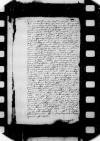List #1886
Ioannes DANTISCUS do Tiedemann GIESEHeilsberg (Lidzbark Warmiński), 1538-07-30
Regest polski:
Dantyszek otrzymał list Giesego wraz z załącznikami. Jest mu przykro, że oszust [Wojciech Kijewski] narzucił Giesemu swoją wolę za pośrednictwem posłańca dostarczającego bulle [Vicentza Walha]. Gdyby Giese przed zapłaceniem zapytał Dantyszka o opinię, posłaniec odszedłby z niczym.
Dantyszek zamierza wkrótce wysłać na dwór królewski posłańca, któremu powierzy list do Georga Hegla z pytaniami w sprawie rachunku i rozliczenia z Fuggerami. W ślad za posłańcem ze szczegółowymi poruczeniami wyruszy Fabian (Wojanowski) Damerau. Dantyszek zawiadomi Giesego o efektach tych działań.
Podoba mu się breve, którego kopię Giese mu wysłał, i obiecuje ze swej strony dołożyć starań, byleby tylko porozumieli się w sprawie dogodnego terminu konsekracji. Wkrótce uda się z Felixem [Reichem] i doktorem [Mikołajem] Kopernikiem w objazd, aby objąć władzę [w diecezji], a następnie podąży do katedry. Tam [we Fromborku] podejmie decyzję w sprawie terminu i poinformuje Giesego. Obiecuje dostarczyć Giesemu brakujące elementy stroju potrzebnego na konsekrację; prosi o przesłanie miar dla rochety i sandałów.
Dantyszek zwraca Giesemu list Dietricha von Reden, obszerniejszy niż ten, który sam dostał. Przekazuje zapomnianą wcześniej prośbę dziekana krakowskiego Samuela Maciejowskiego o polecenie go Giesemu i zapewnia, że uprzednio polecił Giesego Maciejowskiemu i innym panom i przyjaciołom. Radzi, by Giese napisał z podziękowaniami do Maciejowskiego, a przede wszystkim do króla (Zygmunta I ) i królowej (Bony Sforzy). Zyska w ten sposób przyjaźń jego i podkanclerzego [Pawła Dunina-Wolskiego].
Dantyszek informuje Giesego o wizycie Johanna von Werden, który odjechał poprzedniego dnia.
Wysyła kopię z trudem uzyskanego i przesłanego mu przez Maciejowskiego listu królewskiego w sprawie [Anny] Wachsshlagerin (Woszczkowej). Sugeruje zachowanie w tej sprawie sekretu aż do sejmu [Prus Królewskich]. Uznaje treść listu za satysfakcjonującą.
Rękopiśmienne podstawy źródłowe:
Publikacje:
| ||||||||||||||||
Tekst + aparat krytyczny + komentarz Zwykły tekst Tekst + komentarz Tekst + aparat krytyczny Ekscerpty dotyczące podróży Dantyszka
Reverendissimo Domino
Reverendissime mi Domine, frater et amice carissime ac honorande.
Salutem et fraterni amoris commendationem.
Heri cf.
De calculo et supputatione per
Gratum mihi est, quod Dominatio Vestra Reverendissima eiusmodi breve habeat, cuius mihi misit exemplum[1]. In me, quod praestare possum, nihil deerit, modo de tempore consecrationis, quo illi valeamus intendere commodius, conveniamus. Proxime ad capiendam possessionem cum designatis nostris fratribus, domino
videlicet
cf.
Reverendus dominus
Aliud ad praesens scribendum occupato nescio quibus turbis non restat.
Fuit
Mitto exemplum litterarum regiarum in causa
Dominationem Vestram Reverendissimam diutissime fel(icem) or fel(iciter)⌈fel(icem)fel(icem) or fel(iciter)⌉ valere cupio.
Ex
Reverendissimae Dominationis Vestrae frater integerrimus


 BCz, 245, p. 52
BCz, 245, p. 52